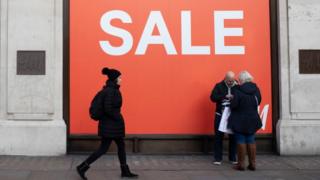 Image copyright
Getty Images
Image copyright
Getty Images
The UK's inflation rate fell to 1.5% in March, largely driven by falls in the price of clothing and fuel ahead of the coronavirus lockdown.
The Consumer Prices Index (CPI) fell from 1.7% in February, according to the Office for National Statistics (ONS).
The ONS said that clothing prices dropped as shops offered discounts as footfall fell just before self-distancing measures were imposed.
Prices of clothes and shoes fell by 1.2% in the year to March 2020.
ONS head of inflation Mike Hardie said: "Clothing prices normally rise between February and March as new year discounting ends.
"However, this year the price of clothes has eased due to some retailers offering discounts due to decreased footfall in stores before the lockdown started."
The ONS added that its data was collected on 17 March, just before lockdown started on the 23rd.
Although it does not yet have a full picture of how new restrictions have affected shoppers, it suggested that people were already spending less time browsing in-store, and perhaps choosing to spend more on necessities, such as food.
The British Retail Consortium has warned that thousands of jobs could be at risk as High Street shops come under pressure amid the coronavirus pandemic.
'Steep recession'
The fall in inflation in March was also partly due to the collapse in oil prices on global markets filtering through to prices at the pump.
Average petrol prices stood at 119.4 pence per litre, the lowest seen since February 2019, while diesel stood at 123.8p
Mr Hardie added: "The cost of raw materials for manufacturers fell significantly over the year, driven by a global fall in the price for crude oil, which is at its lowest level since early 2016."
The UK benchmark for oil has fallen to about $16 (£13) a barrel as economic activity has slowed.
What do I need to know about the coronavirus?
Sarah Hewin, senior economist at Standard Chartered bank, told the BBC's Today programme: "We have seen oil prices falling quite substantially, and that is likely to be a factor going forward.
"It was trading at over $60 a barrel - today it's down at $16. That's over 75% down since the start of the year."
She added: "Normally low inflation would be welcomed as it means people have effectively more to spend in the shop but these are not normal circumstances. The fall in inflation, in addition to low energy prices, is an indication of the steep recession we will see in the coming months."
'More help needed'
CPI remains below the Bank of England's 2% target for inflation.
Inflation is one of the main factors that the Bank of England's Monetary Policy Committee (MPC) considers when setting the "base rate". That influences what interest rate banks can charge people to borrow money, or what they pay on their savings.
Last month it took the decision to cut interest rates in an emergency move as it tries to support the UK economy in the face of the coronavirus pandemic.
The UK's central bank brought them down to 0.1% from 0.25%. Interest rates are now at the lowest ever in the Bank's 325-year history.
The Bank said it would also increase its holdings of UK government and corporate bonds by £200bn in an effort to lower the cost of borrowing.
But Melissa Davies, chief economist at Redburn, said the Bank needs to go further: "It will be a volatile ride for inflation over the next year, with negative numbers a possibility followed by a sharp reversal.
"The underlying trend is one of lower prices, however, as the economy is unlikely to catch up the ground lost during this initial shock."
She added: "More stimulus is needed, with only limited QE help from the Bank of England and the Treasury's lending guarantee scheme falling short. Even the furlough scheme is only delaying an inevitable and large spike in unemployment."